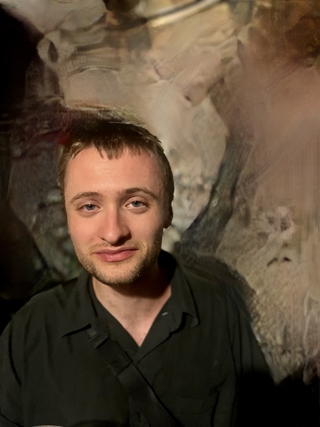
Henry Hodder is a guitarist, composer, producer, and educator based in New Haven, CT. A 2020 graduate of Wesleyan University with a BA in English, Henry’s work blends poetic sensibility with a fascination for the intersection of music and mysticism. In 2023, Henry released the EP Soon with renowned sarangi player Suhail Yusuf Khan as part of their collaborative project Pīlu. He also performs as a solo artist and collaborates with musicians across a variety of genres and musical traditions, embracing improvisation as a site of emotional and transcendent potential.
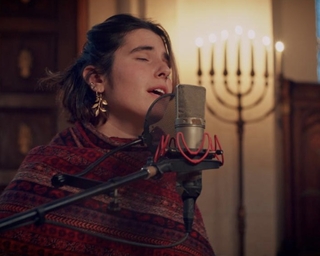
Marni Loffman is an American, Jewish composer, vocalist, educator and prayer leader. Marni holds a BA in Cultural Anthropology and Religion, an MA in Peacebuilding and is currently studying to be ordained as a Rabbi. Marni’s musical work weaves together eclectic sounds – sounds of a multi-denominational religious upbringing, of Ashkenazi, eastern European ancestry, of cross-cultural, multi-faith musical relationships and of sonic influences growing up in the United States, such as American folk, pop, jazz and neo-soul. the long short path, Marni’s debut album, is both analytical and embodied, exploring Jewish belonging, diasporic identity, doubt, grief, spirituality and healing through combining rabbinic and liturgical poetry and prose with original lyrics. Marni is passionate about using music, writing and learning to hold complexity and contradiction, to cultivate joy, and to make space for emotional expression.
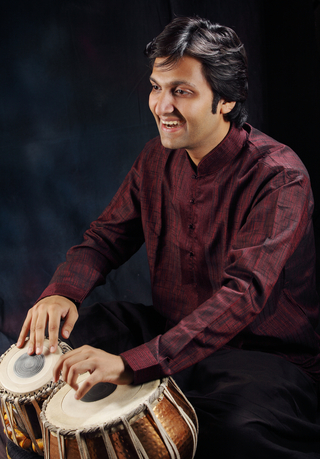
Soulful musicality along with graceful virtuosity makes Vishal Nagar truly a gifted Tabla musician of his generation. Rhythmic creativity and a strong emotional connection with his music contribute to Vishal’s admiration as a performer amongst dancers, vocalists and instrumentalists alike. Also, a dynamic soloist, he has been one of the youngest Indian musicians to perform at the WOMAD music festival, World Rhythm Festival, and Bumbershoot to mention a few. Son of the renowned Kathak danseuse and vocalist Vidushi Urmila Nagar, Vishal has been trained under his mother, Late Ustad Latif Khan and Ustad Shamim Ahmed Khan of the Delhi Gharana. A vibrant performer, Vishal is also a sought after and dedicated educator based out of New Delhi and San Francisco Bay Area who continues to perform and teach in India, the US and abroad.
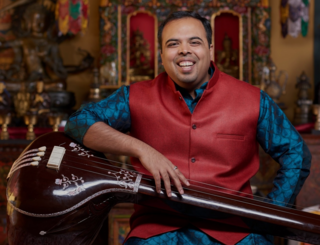
Samarth Nagarkar is a Khayal musician (Hindustani / North Indian classical voice music) - singer, educator and author, regarded as a flag-bearer of raga music globally. His music is often described as a rich blend of traditional authenticity with a deeply emotive, meditative, introspective and healing quality. Samarth features in music festivals and venues around the world, some prominent appearances including, Lincoln Center (New York), ITC Sangeet Sammelan (Kolkata), LearnQuest Music Conference (Boston), Central Park Summer Stage (New York), Metropolitan Museum of Art (New York), Chicago World Music Festival, The Continuum Festival (San Francisco), and Dakkhini Music Conference (Kolkata).
He has several solo as well as collaborative albums to his credit and has authored the much lauded book, ‘Raga Sangeet’. He is a Voting Member of the Recording Academy, popularly known as the Grammys. He was awarded a Fellowship by the Ministry of Culture, Government of India and was one of the youngest to win the prestigious and highly competitive All India Radio’s National Music Competition. In 2022, Samarth was awarded the NAKA Outstanding Achievement Award for Excellence in the Arts. Samarth trained under two distinguished masters, Ulhas Kashalkar and Dinkar Kaikini, in the guru-shishya system, where the disciple lives with the guru for several years and acquires deep insight and mastery in the art form through complete immersion. He was also a scholar at the ITC Sangeet Research Academy, Kolkata. Through intensive training and decades of study and practice Samarth has earned a rare distinction of being proficient in three styles or gharanas - Gwalior, Agra and Jaipur.
As an educator, in addition to training gifted students deeply committed to raga music, Samarth frequently lectures at universities like NYU and MSM as well as at middle and high schools across the country, working relentlessly to make this genre accessible to listeners, through short courses, masterclasses and innovative presentations. Previously, Samarth served as head of the K. K. Kapoor Music Academy, Lucknow, and as Guru and Director of Academic Affairs at Chhandayan Center for Indian Music, New York. As a voice coach, he has worked with several prominent personalities, including star actor Priyanka Chopra, and musicians from other genres of singing such as opera and jazz.
He currently runs Raga Sangeet Creative, an initiative towards concert curation, music education and publication. He is a founding member of Brooklyn Raga Massive (a collective striving to make raga music mainstream and to create sustainable livelihoods for musicians) and a curator of their Colors of Raga deep-listening concert series. Samarth is among the first to scale digital platforms like Patreon in the Indian classical music world, pioneering new avenues of audience engagement, music education, mentorship and monetization.
https://samarthnagarkar.com/
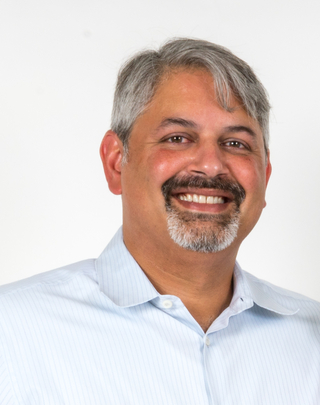
Dard Neuman is the Hasan and Khan Endowed Chair of Classical Indian Music and Associate Professor of Music at the University of California, Santa Cruz. He received his Ph.D. in Anthropology from Columbia University in 2004 and joined the music faculty at UC Santa Cruz in 2005. Neuman served as department chair for six years, chair of the Committee on Planning and Budget for three years, and is currently Associate Dean of the Graduate Division.
Neuman’s research interests focus on the musical transmission and performance of Hindustani music post 1857. Recently, he developed the Interactive Digital Transcription and Analysis Platform” (IDTAP), a web-based application funded by the National Endowment for the Humanities, Office of Digital Humanities (NEH-ODH). The IDTAP enables scholars, musicians, and students to study or digitally transcribe, archive, share, and analyze audio recordings of oral melodic traditions.
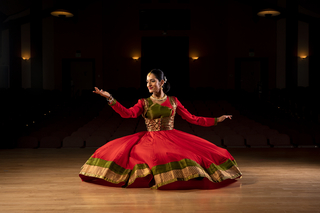
Ameera Nimjee is an Assistant Professor in the Departments of Music; Theater, Dance, and Performance Studies; and South Asian Studies at Yale University. Her research is on the study of bodies, movement, and transnational politics in South Asian performance cultures. She is currently at work on two larger projects: on creativity in contemporary dance economies and performances of migration among Muslims who have moved between [South] Asia, East and South Africa, and North America. A member of Toronto-based Chhandam Dance Company, she performs as a kathak dancer under the tutelage of Joanna de Souza.
Suhail Yusuf (stage name: Suhail Yusuf Khan) received his Ph.D. in ethnomusicology from Wesleyan University ’24. His dissertation, “Bridge Overtones: Lessons from the Sarangi” is the first in-depth ethnomusicological study of the North Indian bowed instrument tradition by a hereditary sarangi player. He brings together expertise from a performance career that has extended over twenty-five years and academic research to explore issues of gender, castes, ethnicity, and exclusion as they pertain to the performance, circulation, and reception of music. Suhail’s project at the ISM, “The Sonic Resonance of Interfaith, Identity, and Inclusion Practices in Contemporary Music Making” aims to examine the diverse transnational dialogues between musicians of different faiths, ethnicities, and genders in the United States. It focuses on the events and relationships between Western and Indian musicians exploring musical forms including Qawwālī (South Asian Sufi Songs), Khyāl (pre-modern Indian classical songs), Ashkenazi Jewish liturgical nusach (music style or tradition), Bhajan (Hindu devotional songs), and music by Abbess Hildegard of Bingen (1098-1179). Suhail comes to Yale from the University of Hartford’s Hartt School of music, dance, and theatre where he taught and designed curriculum as a Visiting Assistant Professor of Music History (2021-2024).
